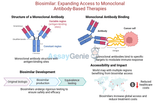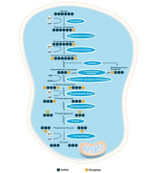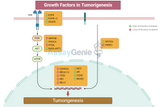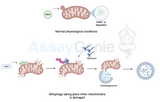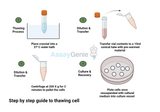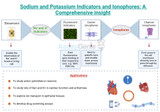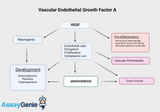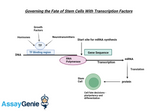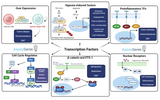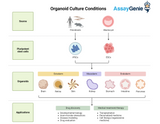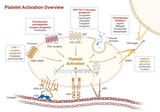Blog
Crizanlizumab: A Comprehensive Overview of Its Role in Sickle Cell Disease and Ongoing Research
Quick Facts About CrizanlizumabWhat is Crizanlizumab?Crizanlizumab is a monoclonal antibody used to treat sickle cell disease by targeting P-selectin, a protein involved in inflammation and blood cell adhesion.What is the mechanism of action for Crizanlizumab?Crizanlizumab works by inhibiting P-selectin, reducing sickling of red blood cells, and decreasing the frequency of vaso-occlusive crises in patients with sickle cell disease.What are the clinical applications of Crizanlizumab?Crizanlizumab is primarily used in sickle cell disease treatment, particularly for patients experiencing frequent pain episodes (vaso-occlusive crises).Is Crizanlizumab FDA-approved?Yes, Crizanlizuma
…
7th Feb 2025
Denosumab: A Comprehensive Overview of Mechanism, Applications, and Research Advances
What You Need to Know About DenosumabWhat is Denosumab?Denosumab is a monoclonal antibody used primarily to treat osteoporosis and bone-related complications in cancer patients. It targets RANKL (Receptor Activator of Nuclear Factor Kappa-Β Ligand), inhibiting osteoclast formation and activity to prevent bone resorption.What is the mechanism of action for Denosumab?Denosumab works by binding to RANKL, a protein responsible for stimulating the formation and function of osteoclasts, which are cells that break down bone tissue. By inhibiting RANKL, Denosumab reduces osteoclast activity and bone resorption.What are the clinical applications of Denosumab?Denosumab is used to treat o
…
2nd Feb 2025
Ivuxolimab: Redefining Cancer Immunotherapy and Research
Quick Facts About IvuxolimabWhat is ivuxolimab?Ivuxolimab is a monoclonal antibody targeting CD47, a "don't eat me" signal that cancer cells exploit to evade immune destruction.How does ivuxolimab work?By blocking CD47, ivuxolimab restores macrophage activity, enhancing the immune system’s ability to recognize and destroy cancer cells.What are the clinical applications of ivuxolimab?It is being explored in treating hematologic malignancies and solid tumors, with ongoing studies highlighting its potential in combination therapies.Is ivuxolimab safe?Early studies suggest a manageable safety profile, with most adverse events being mild to moderate and related to on-target effects.
…
1st Feb 2025
Ponsegromab: A Breakthrough in Heart Failure and Cachexia Research
Quick Facts About PonsegromabWhat is Ponsegromab?Ponsegromab is an investigational monoclonal antibody developed by Pfizer, primarily studied for its potential in treating heart failure and cancer-associated cachexia.What is the Mechanism of Action of Ponsegromab?Ponsegromab targets Growth Differentiation Factor 15 (GDF-15), a cytokine linked to inflammation, appetite regulation, and muscle wasting. By inhibiting GDF-15, Ponsegromab aims to counteract cachexia and improve patient outcomes in cardiovascular and cancer-related conditions.What Are the Clinical Applications of Ponsegromab?Ponsegromab is being evaluated for its potential to mitigate muscle wasting in heart failure a
…
29th Jan 2025
Zolbetuximab: A Breakthrough in Targeting Claudin 18.2 for Cancer Treatment
Quick Facts About ZolbetuximabWhat is Zolbetuximab?Zolbetuximab is a monoclonal antibody that targets Claudin 18.2, a protein overexpressed in gastric and pancreatic cancers, enhancing targeted therapy.What is the mechanism of action for Zolbetuximab?It binds to Claudin 18.2, triggering antibody-dependent cellular cytotoxicity (ADCC) and complement-dependent cytotoxicity (CDC), leading to tumor cell death.What are the clinical applications of Zolbetuximab?It is being investigated for treating gastric and pancreatic cancers, particularly in patients with high Claudin 18.2 expression.1.) Understanding ZolbetuximabZolbetuximab is an investigational monoclonal antibody developed by
…
27th Jan 2025
What is the difference between PBS and dPBS?
In the realm of biological and biochemical research, solutions play a pivotal role in various experimental procedures, from cell culture to molecular biology assays. Among the plethora of solutions utilized, phosphate-buffered saline (PBS) and Dulbecco’s phosphate-buffered saline (DPBS) stand out as crucial components. While both solutions share similarities, they possess distinct compositions and applications that merit exploration and understanding.Phosphate-Buffered Saline (PBS): A Versatile SolutionPBS, a staple in laboratories worldwide, serves as a fundamental isotonic buffer solution utilized across diverse applications. Its composition typically consists of sodium chlor
…
31st Dec 2024
Biosimilar: Expanding Access to Monoclonal Antibody-Based Therapies
1. What is a Biosimilar? A biosimilar is a biologic medical product that is highly similar to an already-approved reference biologic. While minor differences in clinically inactive components may exist, biosimilars match the reference product in terms of safety, efficacy, and quality. HDBS0016 represents one such advancement, offering a cost-effective alternative for biologic therapies. 2. Key Features of HDBS0016 Mechanism of ActionBiosimilar HDBS0016 mimics the mechanism of its reference biologic, targeting specific pathways or antigens depending on its indication. These include:Immune Checkpoint Inhibition: Enhancing T-cell activity by blocking inhibitory recep
…
5th Dec 2024
Amino Acids: Functions, Roles, and Structures
Amino acids are the fundamental units of proteins, playing critical roles in virtually every biological process. Composed of a central carbon atom bonded to an amino group (-NH₂), a carboxyl group (-COOH), a hydrogen atom, and a unique side chain (R-group), amino acids are classified based on their side chain properties and functions. This article explores the 20 standard amino acids, describing their functions and providing a detailed chart with their structures.Assay Genie · Amino Acids_ Functions, Roles, and Structures1. The Roles of Amino AcidsAmino acids contribute to numerous physiological processes beyond protein synthesis.Key Functions:Protein Building: Combine in variou
…
22nd Nov 2024
MHC Class I vs MHC Class II: Key Differences and Functions
Major Histocompatibility Complex (MHC) molecules are essential for immune recognition and response. They are specialized glycoproteins that present antigens to T cells, allowing the immune system to identify and eliminate pathogens or abnormal cells. MHC molecules are classified into Class I and Class II, each with distinct structures, functions, and roles in immune defense.This article explores the differences between MHC class I and MHC class II, highlighting their unique features and immune significance.Assay Genie · MHC Class I vs MHC Class II_ Key Differences and Functions1. Overview of MHC MoleculesMHC molecules play a crucial role in antigen presentation, enabling the ada
…
22nd Nov 2024
M2 Supplement for Organoid Cell Culture: Enhancing Growth and Differentiation
The use of M2 Supplement in organoid culture has revolutionized the way researchers cultivate and maintain these three-dimensional (3D) cellular models. Organoids—self-organizing cell clusters that mimic the structure and function of actual tissues and organs—are widely used in disease modeling, drug discovery, and regenerative medicine. M2 Supplement enhances organoid culture by providing essential nutrients and growth factors that support the growth, viability, and differentiation of cells within these complex systems.Assay Genie · M2 Supplement for Organoid Cell Culture_ Enhancing Growth and Differentiation1. What is M2 Supplement?M2 Supplement is a cell culture additive spec
…
12th Nov 2024
Biological Role of GLP-1
Glucagon-like peptide-1 (GLP-1) is a critical hormone in the regulation of glucose metabolism and has garnered significant attention due to its therapeutic potential in managing diabetes and obesity. Understanding the biological role of GLP-1 provides insights into its mechanisms of action and its impact on various physiological processes.Introduction to GLP-1GLP-1 is an incretin hormone primarily produced in the L-cells of the small intestine in response to food intake. It plays a pivotal role in enhancing insulin secretion from the pancreas, a process crucial for maintaining glucose homeostasis. GLP-1 is derived from the proglucagon gene and exists in two main forms, GLP-1(7-3
…
20th Jun 2024
Growth Factors Can Cooperate to Promote Tumorigenesis
Introduction Tumorigenesis, the process by which normal cells transform into cancer cells, is a multifaceted and complex event influenced by various internal and external factors. Among these, growth factors play a pivotal role in cellular communication and regulation, often being the critical elements that can tip the balance towards cancer development when dysregulated. This article delves into how growth factors, through their intricate network and interactions, can cooperate to promote tumorigenesis, highlighting the mechanisms behind their action and the implications for cancer therapy. The Role of Growth Factors in Cell Regulation Growth factors are proteins that bin
…
3rd May 2024
Illuminating the Multifaceted Role of Acetylation: Bridging Chemistry and Biology Introduction:
Acetylation, a chemical process characterized by the addition of an acetyl functional group to a molecule, stands as a cornerstone in both biochemical and biological landscapes. Its significance traverses diverse realms, ranging from fundamental cellular processes to intricate disease pathogenesis. This article endeavors to delve deeper into the multifaceted world of acetylation, exploring its intricate mechanisms, diverse functions, and far-reaching implications in health and disease. Chemistry of Acetylation: Acetylation, at its essence, involves the transfer of an acetyl group (-COCH3) to a substrate molecule, a process catalyzed by enzymes known as acetyltransferases. T
…
16th Apr 2024
Mitophagy: The Cell's Cleanup Crew for Healthy Living
Mitophagy, a term derived from the fusion of "mitochondria" and "autophagy," represents a vital cellular process responsible for the targeted degradation and recycling of dysfunctional mitochondria. Mitochondria, often hailed as the powerhouses of the cell, play a crucial role in energy production, calcium homeostasis, and apoptosis regulation. However, their functionality can be compromised due to various stressors, leading to the accumulation of damaged mitochondria. To maintain cellular health and functionality, cells employ mitophagy as a mechanism to rid themselves of these dysfunctional organelles. In this article, we delve into the intricacies of mitophagy, exploring its molecu
…
26th Mar 2024
Navigating Cell Culture Supplements: Fetal Bovine Serum vs. Horse Serum in Biomedical Research
The choice of appropriate cell culture supplements emerges as a crucial factor in ensuring the efficacy and consistency of experimental results. Among the various options available, two commonly used supplements are fetal bovine serum (FBS) and horse serum. Both serve as nutrient-rich mediums, facilitating cell growth and proliferation. However, the choice between these two alternatives often sparks debate due to their distinct compositions, applications, and ethical considerations. Understanding Fetal Bovine Serum (FBS): Fetal bovine serum, derived from the blood of bovine fetuses, is a widely utilized supplement in cell culture experiments. It provides essential nutrients
…
25th Mar 2024
How to Thaw Cells: Best Practices for Cell Culture Success
Cell culture techniques are fundamental to biomedical research, providing crucial insights into cellular functions, drug discovery, and disease mechanisms. A critical step in cell culture is the process of cell thawing, which, if not performed correctly, can adversely affect cell viability and experimental outcomes. This comprehensive guide outlines the best practices for thawing cells to ensure cell culture success. Understanding the Basics of Cell Thawing Cell thawing is the process of warming cryopreserved cells to reinitiate their metabolic activities. Cryopreservation is a method used to store cells at extremely low temperatures to halt their metabolism and preserve their ge
…
19th Mar 2024
Sodium and Potassium Indicators and Ionophores: A Comprehensive Insight
Understanding the dynamics of sodium and potassium ions within biological systems is crucial for deciphering cellular processes and developing therapeutic strategies. Sodium and potassium indicators, alongside ionophores, serve as essential tools in the study of these ions' roles within cells. This article delves into the mechanisms, applications, and recent advancements in sodium and potassium indicators and ionophores, providing a thorough understanding of their significance in biological research. Introduction to Sodium and Potassium in Biological Systems Sodium (Na⁺) and potassium (K⁺) are pivotal for numerous cellular functions, including the generation of action potentials,
…
18th Mar 2024
Understanding Blotchy Western Blots: Causes and Remedies
Western blotting is a powerful and widely used technique in molecular biology, essential for detecting and quantifying specific proteins in complex biological samples. However, despite its popularity, Western blotting can sometimes yield frustrating results, with one of the most common issues being blotchy or uneven bands. Blotchy Western blots can arise from various factors, ranging from sample preparation to technical errors during the blotting process. In this article, we'll delve into the potential causes of blotchy Western blots and provide some tips to rectify them. What are Blotchy Western Blots? Blotchy Western blots refer to the uneven distribution of bands across
…
13th Mar 2024
Vascular Endothelial Growth Factor A (VEGFA): A Cornerstone in Angiogenesis and Beyond
Vascular Endothelial Growth Factor A (VEGFA) is a pivotal signaling protein involved in both vasculogenesis and angiogenesis, processes essential for the formation of blood vessels during embryonic development and the growth of new blood vessels from pre-existing ones. As a member of the VEGF family, VEGFA plays a critical role in the regulation of endothelial cell function, affecting vascular permeability and endothelial cell proliferation. The Molecular Biology of VEGFA VEGFA is characterized by its gene located on chromosome 6p21.1, encoding a heparin-binding protein that promotes endothelial cell growth, migration, and survival. The VEGFA protein undergoes complex post-transl
…
9th Mar 2024
Unveiling the Potential of Cy3 Wavelength: Illuminating the Path to Advanced Biomedical Imaging
In the realm of biomedical imaging, the quest for precision and clarity drives researchers to explore innovative technologies. One such breakthrough is the Cy3 wavelength, a powerful tool revolutionizing fluorescence imaging techniques. This article delves into the significance, applications, and advancements of Cy3 wavelength in biomedical research. Understanding Cy3 Wavelength:: Cy3, short for Cyanine 3, is a fluorescent dye belonging to the cyanine dye family. Its exceptional properties make it a popular choice for labeling biomolecules and tracking biological processes under a microscope. Cy3 emits light in the red-orange spectrum, typically around 570 to 590 nanometer
…
23rd Feb 2024
Governing the Fate of Stem Cells With Transcription Factors
The intricate process of stem cell differentiation and self-renewal is a cornerstone of developmental biology and regenerative medicine. At the heart of this complex regulatory mechanism are transcription factors (TFs), which play a pivotal role in determining the fate of stem cells. These proteins bind to specific DNA sequences and regulate the transcription of genes, thereby influencing cell fate decisions and maintaining the delicate balance between pluripotency and differentiation. The Essence of Stem Cells and Their Importance: Stem cells are the architects of development, possessing the unique abilities of self-renewal and differentiation. They serve as a foundational eleme
…
16th Feb 2024
Unraveling the Synergy: How Growth Factors Cooperate to Promote Tumorigenesis
In the intricate ballet of cellular communication and regulation, growth factors play pivotal roles in guiding the processes of cell growth, division, and differentiation. These proteins are essential for normal development and tissue repair. However, when their signaling pathways become co-opted or dysregulated, they can also act as key players in the development and progression of cancer. This article delves into the complex interplay of growth factors and their cooperation in promoting tumorigenesis, shedding light on the molecular mechanisms that underlie cancer development and offering insights into potential therapeutic interventions. The Fundamental Role of Growth Factors in C
…
15th Feb 2024
Optimizing Organoid Culture Conditions: Paving the Way for Revolutionary Advances in Biomedical Research
In the dynamic landscape of biomedical research, organoids have emerged as a groundbreaking tool, offering three-dimensional (3D) models that mimic the complex architecture and functionality of human organs. These miniature, self-organizing structures have revolutionized our approach to understanding human development, disease modeling, and drug discovery. However, the key to harnessing their full potential lies in optimizing organoid culture conditions. This intricate process involves fine-tuning the biochemical and physical environment to support the growth, differentiation, and maturation of organoids. This article delves into the critical aspects of organoid culture, including the se
…
14th Feb 2024
Understanding Platelet Activation: A Comprehensive Overview
Platelet activation plays a pivotal role in hemostasis, the process that stops bleeding and initiates tissue repair after vascular injury. This complex biological mechanism involves the transformation of platelets from a resting state to an active state, enabling them to adhere to the site of injury, aggregate with other platelets, and interact with the coagulation cascade to form a stable blood clot. This article delves into the mechanisms of platelet activation, its significance in hemostasis, and the implications for pathological conditions when dysregulated. The Mechanisms of Platelet Activation Platelet activation is initiated by several triggers, including vascular injury,
…
14th Feb 2024


